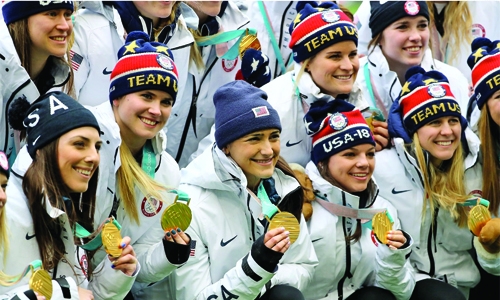US women’s soccer team leads the way in fight for equality
Harrison : Two years after they began a public fight for equal pay, and a year after they signed a new collective bargaining agreement, members of the United States women’s soccer team have emerged as a new kind of role model, and a surprisingly valuable resource, for women’s teams from around the world.
Canada’s soccer team asked for advice on how to get maternity coverage into contracts. W.N.B.A. players did the same when they had questions about how best to press their owners for leaguewide standards on issues like hotels, travel and trainers. And last fall, a player from the United States women’s hockey team reached out.
Only months before the Pyeongchang Olympics, the player said, U.S.A. Hockey was still dragging its feet about marketing promises that had been made when the players used strike threats to win a major pay increase in March 2017. The team, a gold medal contender, still didn’t even have its own social media accounts. Could the soccer team’s union recommend a marketing consultant who could do what the hockey federation apparently would not?
“I think right now there’s really a women’s coming-together movement, and it’s happening in sport and outside of sport,” United States midfielder Christen Press said. “And I think people all around the world are realizing how important it is to make these connections with people on the same journey as you.”
So when the American soccer players embraced the American hockey players on the sideline before playing a 1-1 tie against France at Red Bull Arena — the reigning Women’s World Cup champions meeting the newly crowned Olympic gold medallists — the hugs seemed more genuine, more heartfelt, more personal than usual.
The outreach from other athletes and teams comes in many forms, players from both teams said. It can arrive as text messages between friends or teammates from different countries, or in calls to the union itself. The soccer players can back another team’s fight, or trumpet its victories, with a blast from their well-followed social media accounts.
But little by little, other female athletes around the world have started finding their voices, too.
Spain’s national team rose up to demand the ouster of its coach after the last World Cup, and several prominent members of Brazil’s squad quit their team last year to protest the ouster of a popular female coach in favour of a man. Nigeria’s players held a sit-in at their hotel to demand unpaid salaries and bonuses after winning the African championship. Ireland’s team threatened to strike. Australia’s did. And in October, Norway’s players demanded — and won — equal pay with their men’s counterparts.
“This really feels like a tipping point,” said the ESPN commentator Julie Foudy, a veteran of similar gender-equity fights a generation ago after she won a Women’s World Cup.
Foudy praised the union’s new executive director, Becca Roux, for empowering the United States players to do much of the hard work themselves, both as they negotiated an improved collective bargaining agreement and in the months since it was signed.
Most members of the team serve on one union subcommittee or another, and they hold elections to pick representatives. Regular meetings are held with U.S. Soccer to ensure promises are being kept.
Their progress has not been lost on other teams, which have used the soccer team as a sounding board for their own fights.
Last spring, the hockey players were among the most prominent teams to reach out — before, after, and during their battle with U.S.A. Hockey for improved pay and working conditions.
The hockey players went further than their soccer counterparts — they threatened to boycott the world championships if they did not get their demands met — and they eventually prevailed.
Related Posts

